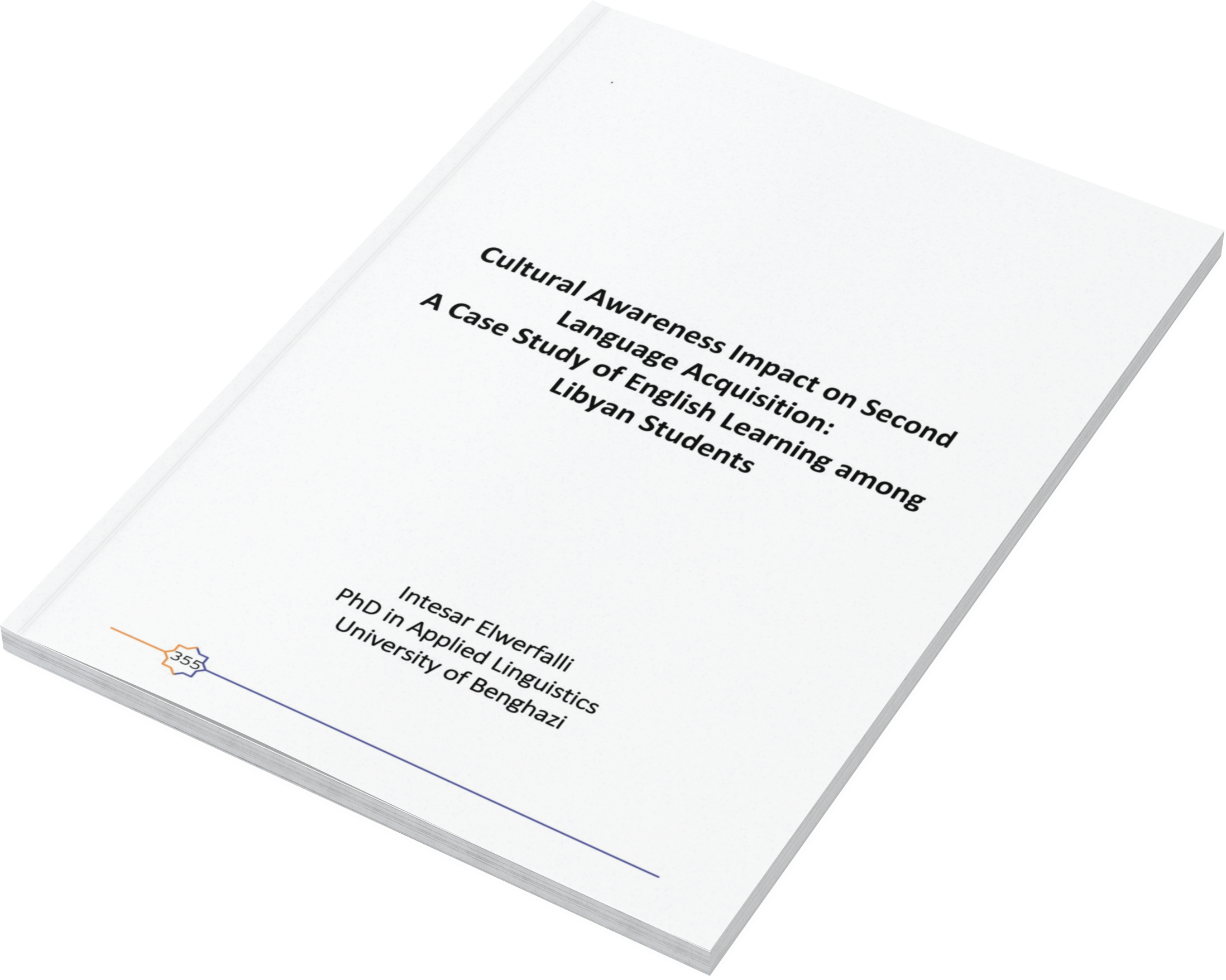تأثير الوعي الثقافي على اكتساب لغة ثانية
دراسة حالة لتعلم اللغة الإنجليزية بين طلاب ليبيين
DOI:
https://doi.org/10.37376/jofoa.vi56.5931الكلمات المفتاحية:
الثقافة، التعلم، الوعي الثقافيالملخص
The teaching of culture through communication has received the attention it deserves in a variety of academic and linguistic contexts across numerous institutions. To communicate in another language, a speaker must have a strong grasp of cultural norms and gestures to convey a message to someone fully. Likewise, cultural context allows for more efficient, natural communication between individuals.
The aim of this study is to show Libyan instructors and learners’' knowledge about culture and language, as well as the perception toward cultural awareness as a contributing factor in learning and mastering a language. The population of this study were 20 fifth semester students of academic year 2022 and ten instructors of the Faculty of languages at the university of Benghazi.
In order to achieve the goals, two questionnaires were opted as data collection tools. A questionnaire for students and another one for instructors. With regard to learners, the results of this study showed positive perception of cultural awareness as a contributing factor in learning English. Although the students knew the importance of culture, they did not link this importance to language learning. While there is a strong willingness among students to engage with cultural diversity, there is also a need for language learning curriculum to better integrate cultural content to enhance students' cross-cultural communication skills effectively.
In the part of instructors, the results showed that although teachers are aware of the significance of culture and its role in mastering language learning, they do not integrate culture into their teaching in order to develop intercultural competence among learners due to some obstacles.
التنزيلات
المراجع
Brown, H. D. (2007). Principles of language learning and teaching. Englewood Clipps: Prentice – Hall.
Cao Deming. (2007) Cultivating Innovative International Foreign Language Talents under the Guidance of Scientific Development Views. Foreign Languages
Ellis, R. (1994). The Study of Second Language Acquisition. Oxford: Oxford University Press.
Greey, M. (1994). Honouring diversity: A cross-cultural approach to infant development for babies with special needs. Toronto: Centennial Infant and Child Centre. Adult Education Research Conference. https://newprairiepress.org/aerc/1999/papers/47
Halliday, M.A.K. (1978) Language as Social Semiotic: The Social Interpretation of Language and Meaning. London: Edward Arnold
Hodge, R. and Kress, G. (1998) Social Semiotics . Cambridge: Polity Press.
Kramsch, C.(1993). Context And Culture In Language Teaching, OUP.
Lu, M. (1998). Language learning in social and cultural contexts. Eric Digest. Retrieved October 11, 2006 from http://www.ed.gov.databases/ERIC_Digests/ ed423531.html.
Lucie, V. (2006). Developing cultural Awareness in ELT. University of Pardubice. Published thesis.
McKay, S. L. (2003). The Cultural Basis of Teaching English as an International Language. Online Documents at URL http://www.tesol.org/pubs/articles/2003/tm13-4-01.html.
Myron, W. L., & Koester, J. (2010). Intercultural Competence: Interpersonal Communication Across Cultures. Upper Saddle River, N.J: Pearson Prentice Hall.
Risager, K. (1998). Language Teaching and the Process of European Integration. In M. Byram & M. Fleming (Eds.), Language learning in intercultural perspective. Approaches through drama and ethnography. Cambridge: Cambridge University Press
Still Smoking, Dorothy M. (1999). The Role of Language in the Preservation of a Culture, Adult Education Research Conference. https://newprairiepress.org/aerc/1999/papers/47
Taga, H.A. (1999), Sociology: An introduction. Ismail Brothers Publishers: Lahore.
Thanasoulas, D. (2001). The importance of teaching culture in the foreign language classroom. Retrieved February 12, 2024 from http://radicalpedagogy.icaap.org /content/issue3_3/7-thanasoulas.html
Tomalin, B. & Stempleski, S. (1993). Cultural awareness. Oxford: OUP.
Van Leeuwen, T. (2005)Introducing Social Semiotics. London: Routledge

التنزيلات
منشور
كيفية الاقتباس
إصدار
القسم
الرخصة
الحقوق الفكرية (c) 2024 مجلة كلية الاداب

هذا العمل مرخص بموجب Creative Commons Attribution-NonCommercial-NoDerivatives 4.0 International License.




